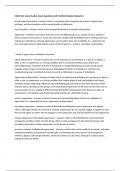COUC 504- Social Justice Exam Questions with Verified Solutions Rated A+
Social Justice Counseling - Answers refers to counseling that recognizes the impact of oppression,
privilege, and discrimination on the mental health of individuals
social injustice - Answers refers to the unequal distribution of rewards and burdens.
oppression - Answers is pervasive and exists across multiple groups (e.g., people of color, people of
lower socioeconomic status or social class, gay men, people with disabilities) and at varying levels (e.g.,
individual, institutional, cultural). Oppression can be said to have two modalities (i.e., oppression by
force and oppression by deprivation) and be of three types (i.e., primary, secondary, and tertiary)
*result of oppression is imbalance of power
oppression by force - Answers involves the act of imposing, on an individual or a group, an object, a
label, a role, an experience, or a living condition that is unwanted and that causes physical or
psychological pain. Examples directed at individuals or marginalized groups include sexual assault,
negative media images of minority groups, kidnapping (of either an individual or members of a
marginalized group), and physical violence toward an individual or a group of individuals.
oppression by deprivation - Answers includes the act of depriving an individual or a group of an object, a
label, a role, an experience, or a living condition that hinders physical and psychological well-being.
Examples include neglecting individuals and withholding job promotions from them because of their
minority status, denying certain groups a rich educational experience on the basis of their skin color or
socioeconomic sta-tus, making it difficult to find affordable transportation from home to a place of
employment, and making it practically impossible to find safe, affordable housing
primary oppression - Answers consists of overt acts representing either of the two modalities of
oppression (i.e., oppression by force, oppression by deprivation)
secondary oppression - Answers involves individuals benefiting from overt oppressive acts against
others. Although individu-als involved in secondary oppression do not actively engage in oppressive acts,
they do not object to others who do engage in overt oppressive acts and do benefit from the oppression
tertiary oppression (internalized oppression) - Answers refers to the identification of the dominant
message by members of the minority group, often to seek acceptance by the dominant group. Like
secondary oppression, tertiary oppression can be passive in nature
structure violence (institutional oppression) - Answers results when social, political, economic, and other
institutional entities and processes intentionally or unintentionally erect barriers to development,
wellness, dignity, and human potential. Structural violence can be overt, although it is often covert,
making it harder to detect.
, ex. providing insufficient funding to inner-city and rural schools, limiting access to healthy and affordable
food, accepting high unemployment rates for certain minority groups, limiting access to quality health
care and preventative care, and making it difficult to find affordable transportation.
privilege - Answers made up of several components, such as having power, access, or unearned
advantage, and holding a majority status
*oppression and privilege are inversely related
empowerment - Answers the process by which people, organizations, or groups who are powerless and
mar-ginalized (a) become aware of the power dynamics at work in their life context, (b) develop the
skills and capacity for gaining reasonable control over their lives, (c) which they exercise, (d) without
infringing on the rights of others, and (e) which coin-cides with actively supporting the empowerment of
others in their community.
*goal of social justice counseling involves empowering disenfranchised groups
resilience - Answers the set of behaviors and attitudes that clients identify as beneficial in coping with
stressful situations and adversity
Milestones - Answers 1. 1971. Counseling and the Social Revolution. a special issue of the Personnel and
Guidance Journal (currently known as the Journal of Counseling & Development) is published. The
publication encourages counselors to actively engage in the social change process and address issues
related to racism, sexism, destruction of the environment, and ending warfare.
2. 1987. the American Association for Counseling and Development (currently the American Counseling
Association [ACA]) publishes a position paper on human rights that urges counselors to advocate for
social change through personal, professional, and political activities.
3. 1992: Sue et al. (1992) publish the multicultural counseling competencies and standards.
4. 1998: Social Action: A Mandate for Counselors, edited by Courtland Lee and Garry Walz, is published.
5. 1999: A special issue of the Journal of Counseling & Development, a publication edited by Tracy L.
Robinson and Earl J. Ginter, is dedicated to racism.
6. 2003: ACA endorses the Advocacy Competencies developed by Lewis, Arnold, House, and Toporek
(2003).
7. 2005: The revised ACA Code of Ethics places an increased emphasis on multiculturalism and social
justice issues in counseling. In particular, the new standard E.5.c. directs counselors to "recognize
historical and social prejudices in the misdiagnosis and pathol-ogizing of certain individuals and groups
and the role of mental health professionals in perpetuating these prejudices through diagnosis and
treatment."




